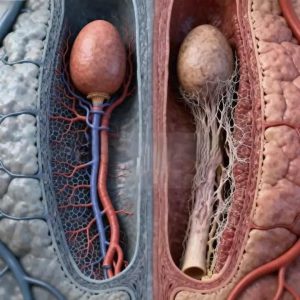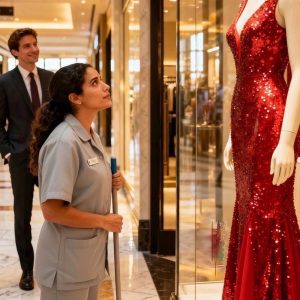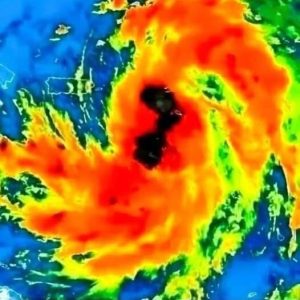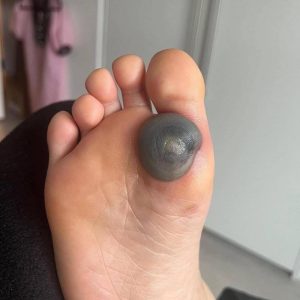There are moments in childhood that don’t announce themselves as life-changing. They don’t come with dramatic speeches, bright lights, or sweeping music. They arrive quietly—sometimes in something as ordinary as a plastic container sitting on a kitchen counter. For years, I didn’t understand what that container meant. I didn’t understand the weight of it, or the silent history behind it. All I saw was food: turkey, stuffing, mashed potatoes, gravy. Packed carefully, layered neatly, still warm in the center as though someone rushed it over while the rest of the world was sitting around their own full table. But as a child, I didn’t yet see the truth beneath the surface—that someone, somewhere, had looked into our life and recognized what we were trying so hard to hide. Someone had noticed the way my mother stretched meals like elastic, the way she cut portions smaller each week, the way she masked her own hunger with a tight smile and an air of practiced normalcy. Someone had also noticed the way I learned to pretend—pretend I wasn’t hungry, pretend a glass of water was enough, pretend that the growl in my stomach was just the sound of growing up. That container told a story long before I could read it.
Opening it in the kitchen that night felt almost illicit, like crossing a boundary we never asked for but couldn’t refuse. I peeled back the lid, and steam slipped out like a whispered confession. The smell of real food—not canned, not stretched, not improvised—filled our tiny kitchen. Rich, savory, comforting. I remember my mother standing in the doorway, her hands still damp from washing dishes we barely used. When she saw the container open, her face shifted—first surprise, then something softer, then something that hurt to look at. It wasn’t pity. It wasn’t shame. It was a complicated mix of gratitude and heartbreak—because that container acknowledged something she had spent years trying to keep invisible. It meant someone had seen her struggle, her sacrifice, her quiet desperation to shield me from hunger and shield herself from the humiliation of needing help. It meant the façade had cracked. Someone knew.
That Thanksgiving became a turning point—not because our circumstances suddenly changed, but because my understanding of care did. Until then, I thought help always came wrapped in warmth and kindness. I believed love was gentle, soft-spoken, and easy to recognize. But the truth is that care is often clumsy. It can sound like judgment. It can arrive in a tone that feels sharp. It can embarrass you before it helps you. Someone might say, “I thought you could use this,” in a way that stings more than it soothes. Someone might point out what you were trying to hide. Acts of compassion, especially from people who don’t know how to express tenderness, can land awkwardly—like a heavy footstep in a quiet room. That container, however uncomfortable, was ultimately an act of noticing. And noticing is a form of love. Someone saw a need and chose not to look away.
As I grew older, I started replaying that moment in my mind, wondering who had packed it, who had taken the risk of delivering it, who had decided to intervene in a situation they could easily have ignored. Maybe it was a neighbor who caught a glimpse of our near-empty fridge or overheard something through thin apartment walls. Maybe it was a teacher who noticed how quickly I ate school lunch or how eagerly I lined up for seconds. Maybe it was someone my mother barely knew—someone who recognized struggle because they had lived it themselves. Whoever it was, they acted without knowing how their gesture would be received. They risked embarrassing us, angering us, or being rejected. But they acted anyway. And that, I began to understand, is another truth about compassion: sometimes it asks for courage—not from the receiver, but from the giver.
That moment changed the way I saw people—especially those who seem brusque, blunt, or difficult to read. Growing up, I often assumed that warmth was the only indicator of kindness. If someone spoke gently, I trusted them. If someone was short or rough in their tone, I assumed they didn’t care. But now, when I encounter people who act like that—people with awkward hands and unpolished words—I leave room for possibility. I leave room for the idea that their rough edges may be armor, or habit, or history. Some people never learned how to express tenderness because tenderness wasn’t given to them. Some people care deeply but have only blunt tools for showing it. Some people love in ways that are practical rather than poetic. That Thanksgiving helped me see that compassion isn’t always beautiful. Sometimes it’s messy. Sometimes it’s uncomfortable. Sometimes it’s delivered in a plastic container that makes you feel exposed before it makes you feel fed.
As an adult, I carry that memory with me quietly, like a folded note in a pocket. Every Thanksgiving, without fail, I pack an extra plate of food. I don’t announce it. I don’t frame it as charity. I don’t make a spectacle of kindness. I think about the kid I once was—the kid pretending not to be hungry, pretending everything was fine, pretending not to notice the strain in the air. I think about the way a single meal arrived unasked-for and changed not our finances or circumstances, but our sense of being seen. So now, each year, I pack an extra plate for someone else who might need it. It’s my way of passing on a message I didn’t hear out loud but felt deeply: you are not a burden. You are allowed to need. You are allowed to accept help without apology. Sometimes the world notices in ways you don’t expect. Sometimes love arrives disguised as inconvenience or embarrassment. But it arrives. And when it does, it reminds us that survival has never been a solo act.
That plastic container became more than a meal. It became proof that even in moments of scarcity, there is room in the world for quiet generosity. It became a reminder that dignity and need can coexist. It taught me that compassion doesn’t require perfection—only awareness and action. And it taught me that the smallest gesture, given at the right time, can feed more than a stomach. It can feed a sense of worth, of belonging, of being cared for in a world that often asks us to pretend we don’t need anything at all.
And so, every year, I return to that lesson—not with fanfare, but with a simple act. An extra plate, wrapped carefully. Still warm at the center.





